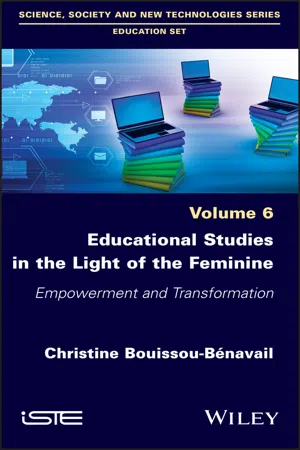
Educational Studies in the Light of the Feminine
Empowerment and Transformation
- English
- ePUB (mobile friendly)
- Available on iOS & Android
Educational Studies in the Light of the Feminine
Empowerment and Transformation
About This Book
From the theory-practice couple, there are various ways to approach educational and training issues. Intervention research, reflexive situated action and innovation are some of them. Through the analysis of the author's various experiences - professional and initial training, support for change, organizational assessment, experiential learning, project management - this book explores questions about social or professional contexts and the subjective training of actors. One of the challenges is to understand and challenge phenomena such as the development of autonomy and subsidiarity in changing academic or academic contexts. The book promotes the emergence of an ethical and resilient subjectivity. It will show that storytelling is methodological resources for research-intervention paradigms, support the development of actors and stimulate mobility. The book introduces the hypothesis of an operational principle of the feminine as fluid gender, added value to the collective intelligences of the processes of transformation of education and teaching, in terms of intergenerational transmission and in terms of transferability and Strategic activation of skills between business sectors and intellectual fields. This praxeology reconsiders organizations, temporalities, frames of reference, relaunches a reflection in action at the heart of structuration-transformation projects in governance of public action, as well as in terms of personal and collective encapacitation. The reflection opens to questions of management of conflictualities and management of the subjective, epistemological and professional economies.
Frequently asked questions
Information
1
Towards Developmental Psychodynamics
1.1. Spatio-temporal points of reference and development
1.1.1. Sense of normativity
1.1.1.1. Normativity: orientation of behavior
“From his years as a pacifist Canguilhem had thus retained not a love of revolt or opposition, but the very essence of their deep causality: a true spirit of resistance, grounded in the effectiveness of prohibition and authority. Every man ought, in his view, to be a rebel, but every rebellion ought to aim at a creation of an order higher than that of subjective liberty: an order of reason and conceptuality.” (Roudinesco 2010, p. 25)
“I am well to the extent that I am able to take responsibility for my actions, to bring things into existence and to create relationships between things that would not come to them without me, but which would not be what they are without them. And so I need to get to know what they are in order to change them.” (Canguilhem 2002, p. 68, author’s translation)
“To live, for the animal already, and even more so for the human, is not only to vegetate and conserve, it is to face risks and to triumph over them. Health is precisely, and mainly in humans, a certain latitude, a certain play of norms of life and behavior. What characterizes it is the capacity to tolerate the variation of standards to which only the apparently guaranteed and always necessarily precarious stability of situations and the environment confers a misleading value of definitive normality.” (Macherey 2016, author’s translation)
- – in supporting the student’s professional project and by focusing on cases of young people in biographical and professional transition;
- – by making research an individuation lever for actors (researchers, stakeholders), by encouraging the reflexive process of anamnesis and elaboration;
- – as part of the monitoring and evaluation of a higher education establishment strategy (territorial integration, development issues).
1.1.1.2. Normativity: knowledge and academic ethos
“They are locked in a perspective of doing, by seeking immediate success, and they handle school tasks without trying to grasp the meaning of them, that is, what they could potentially learn from them.” (Bautier and Goigoux 2004, p. 90, author’s translation)
- – it is atten...
Table of contents
- Cover
- Table of Contents
- Title page
- Copyright
- Acknowledgements
- Introduction: History of Thought
- 1 Towards Developmental Psychodynamics
- 2 Governance and Transformation
- 3 Women: Lines of Research in Development
- Conclusion: Potential
- References
- Index
- End User License Agreement